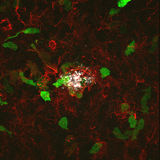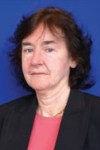October 8, 2010
Got Memory? Neuroinflammation and Cognitive Dysfunction in Chronic Disease and Aging
 Welcome
Welcome
Inflammation in the nervous system, or neuroinflammation, is a common phenomenon in neurodegenerative diseases, such as Alzheimer’s disease (AD) and Parkinson’s disease, developmental diseases, such as Down syndrome, and even normal aging. Much research has been aimed at understanding whether inflammatory processes are a causative or contributing factor to the mental decline in these states or whether it is a secondary result of other ongoing processes. Regardless, it is clear that neuroinflammation can have deleterious effects on neuronal integrity, synaptic function, and behavioral memory. Since neuroinflammation is a commonality across a host of disorders and diseases associated with cognitive decline, we are hosting a symposium, to address the role of neuroinflammation in the molecular pathology and behavioral memory impairments of aging and a variety of chronic diseases.
Speakers
 Neuroinflammation associated with sustained IL-1β expression clears amyloid plaques, but impairs hippocampal learning and neurogenesis
Neuroinflammation associated with sustained IL-1β expression clears amyloid plaques, but impairs hippocampal learning and neurogenesis
M. Kerry O'Banion, M.D., Ph.D., University of Rochester
Dr. O'Banion received his M.D. and Ph.D. in Microbiology in 1987 as part of the Medical Scholars Program at the University of Illinois, Urbana-Champaign. He entered a postdoctoral fellowship at the University of Rochester in the departments of Medicine and Biochemistry that led to the discovery of cyclooxygenase-2 as a major mediator of inflammation. Dr. O'Banion is currently a tenured Professor in the Department of Neurobiology & Anatomy at the University of Rochester Medical Center. Research in the O'Banion laboratory focuses on the role of cytokines and lipid mediators in promoting neuroinflammation with active projects in Alzheimer's disease and radiation injury funded by NCI, NIA, NASA and the DOE.
 Enduring consequences of early-life infection for neuroinflammation and cognition throughout the lifespan
Enduring consequences of early-life infection for neuroinflammation and cognition throughout the lifespan
Staci Bilbo, Ph.D., Harvard University
Dr. Bilbo received her Ph.D. in Psychology and Brain Sciences from John's Hopkins University in 2003, and continued her training with a postdoctoral fellowship at the University of Colorado at Boulder. She is now an Assistant Professor of Psychology and Neuroscience at Harvard University. She has won numerous research awards including the Robert Ader New Investigator Award and the Duke Institute for Brain Sciences Research Incubator Award. Current research in her laboratory focuses on understanding the consequences of early life immune challenges, including infection, stress, drugs of abuse, and maternal obesity on neural and immune system development and later cognitive function and behavior in adulthood.
 Factors which affect age-related neuroinflammation and the associated deficit in synaptic function
Factors which affect age-related neuroinflammation and the associated deficit in synaptic function
Marina Lynch, Ph.D., Trinity College
Dr. Lynch is Professor of Cellular Neuroscience in the Trinity College Institute of Neuroscience, Dublin, Ireland. She is a Fellow of Trinity College Dublin and a member of the Royal Irish Academy, which recognizes excellence in different disciplines including the sciences. She has published over 150 papers and her recent work focuses on evaluating the role of neuroinflammation in the deterioration of synaptic function which is a hallmark of aging. Her current team of 14 comprises 8 graduate students and 6 post-doctoral fellows.
 Cell-based nanoformulated drug delivery to the CNS: A new frontier for neural repair
Cell-based nanoformulated drug delivery to the CNS: A new frontier for neural repair
Howard Gendelman, M.D., University of Nebraska
Dr. Gendelman obtained his M.D. from the Pennsylvania State University-Hershey Medical Center and completed a residency in Internal medicine at Montefiore Hospital, Albert Einstein College of Medicine and a Clinical and Research Fellowship in Neurology and Infectious Diseases at the Johns Hopkins University Medical Center. He occupied senior faculty and research positions at Johns Hopkins, the National Institute of Allergy and Infectious Diseases, the Uniformed Services University, the Walter Reed Army Institute of Research, and the Henry Jackson Foundation for the Advancement in Military Medicine before joining the University of Nebraska Medical Center in 1993 where he is now the Larson Professor of Internal Medicine and Infectious Diseases and Chair of the Department of Pharmacology and Experimental Neuroscience.
 Elucidating the cell- and stage-specific role(s) of TNF-alpha during Alzheimer's disease pathogenesis
Elucidating the cell- and stage-specific role(s) of TNF-alpha during Alzheimer's disease pathogenesis
William Bowers, Ph.D., Adjunct Associate Professor University of Rochester
Dr. Bowers received his Ph.D. in Microbiology from the University of Rochester in 1995, after which he continued with a postdoctoral fellowship improving herpes simplex virus amplicon vectors for therapeutic gene delivery to the central nervous system. He is now an Associate Professor in the Department of Neurology and the Center for Neural Development and Disease at the University of Rochester Medical Center. Dr. Bowers has published 70 peer-reviewed manuscripts and holds 11 patents. He also serves as the associate editor for BMC Neuroscience.
 The brain that changes itself in a model of NeuroAIDS
The brain that changes itself in a model of NeuroAIDS
Harris Gelbard, M.D., Ph.D., University of Rochester
Dr. Gelbard came to URMC as a postdoctoral fellow supported by the Dana Foundation in 1989. In 1990, he became an Assistant Professor of Child Neurology. Ten years later he was a tenured professor in Neurology with secondary appointments in Pediatrics and Microbiology & Immunology. In 1999, he was invited to join the newly created Center for Aging and Developmental Biology, which was renamed the Center for Neural Development and Disease. When the original center director Howard Federoff left in 2007 to become the CEO of Georgetown, Gelbard became the interim director, and in 2008 became the permanent director. Originally trained as a molecular neuropharmacologist and pediatric neurologist, Gelbard's interest in NeuroAIDS began when he came to Rochester, and through his former Child Neurology division chief, Leon Epstein, met Howie Gendelman and Steve Dewhurst, colleagues that he continues to collaborate with on several NIH-funded programs relevant to both the neuropathogenesis of HIV-1 and to the development of adjunctive small molecule therapeutic agents.